
ADIPOTIDE KIDNEY FAILURE
Adipotide, a synthetic peptide developed initially for its weight-loss benefits, has gathered attention for its potential adverse effects on renal function, particularly kidney failure. As obesity continues to be a significant global health challenge, innovations like adipotide emerge as appealing solutions. However, while adipotide demonstrates promising results in reducing fat, it raises substantial concerns regarding its impact on kidney health, primarily due to its function and delivery mechanism.
Adipotide works by targeting adipose tissue’s blood supply, specifically inducing apoptosis, or cell death, of blood vessels that supply fat. This results in reduced fat tissue, contributing to weight loss. However, this very mechanism can inadvertently affect major vascular systems, including those in the kidneys, leading to impaired renal function or kidney failure. In animal studies, significant renal toxicity was observed, presenting a crucial hindrance to adipotide’s development as a viable treatment for human obesity.
The pathophysiology of adipotide-induced kidney failure involves the peptide’s interference with the renal microvasculature. The kidneys, as highly vascular organs, require a robust blood supply to filter waste products from the blood. Adipotide’s action on blood vessels can lead to reduced renal perfusion, ischemia, and potential nephron loss. In severe cases, this can manifest as acute kidney injury or chronic kidney disease, eventually culminating in kidney failure if left unaddressed.
Despite the potential benefits of adipotide in weight management, the risk of kidney damage necessitates a judicious approach in its application. While mitigating obesity is critical for reducing overall health risks, the potential trade-off in kidney health requires careful evaluation. Current research focuses on refining adipotide’s formulation to minimize renal exposure or developing adjunct therapies that can protect renal function while employing adipotide for weight loss.
Conclusion
In weighing the benefits and risks of adipotide, it is crucial to balance its potential to assist in weight management against the substantial risk of renal damage it poses. The promise of adipotide highlights the importance of advancing research that can yield effective treatments without compromising critical organ systems. Until further modifications and protective strategies are developed, caution remains the cornerstone of utilizing adipotide clinically.
FAQs
1. What is adipotide used for?
Adipotide is primarily explored for its potential to reduce fat tissue, assisting in weight loss efforts.
2. How does adipotide cause kidney failure?
Adipotide can disrupt blood flow in the kidneys, leading to diminished renal perfusion and potential kidney damage.
3. Are there ways to prevent kidney damage when using adipotide?
Current research seeks ways to minimize renal impact, but caution and close monitoring are advised when considering adipotide use.
4. Has adipotide been approved for human use?
As of now, adipotide is not approved for widespread clinical use, primarily due to its renal toxicity concerns.
5. What are the signs of kidney failure?
Symptoms may include fatigue, swelling, decreased urine output, and high blood pressure, among others.
For more information, you can visit this Tumblr link.
BIG SALE | FAST SHIPPING
HOT PROMOTIONS!
Adipotide, a peptide under investigation for its potential weight-loss properties, has garnered attention not only for its possible therapeutic benefits but also for its safety profile, particularly concerning kidney function. Preclinical studies have shown that adipotide can induce rapid weight loss by targeting blood supply to fat cells, effectively causing fat cell death. However, one of the significant concerns that have emerged from these studies is the risk of kidney failure associated with its use. The mechanism leading to kidney impairment is believed to be linked to the peptide’s vascular-targeting properties, which might inadvertently affect renal blood vessels, leading to renal toxicity and subsequent kidney dysfunction. Although promising in the realm of obesity treatment, these findings underscore the necessity for extensive clinical trials to better understand the dosing, long-term effects, and safety of adipotide, particularly its renal implications. As the research progresses, ensuring patient safety remains pivotal, demanding a careful assessment of the risk-to-benefit ratio in the potential therapeutic use of adipotide.
















